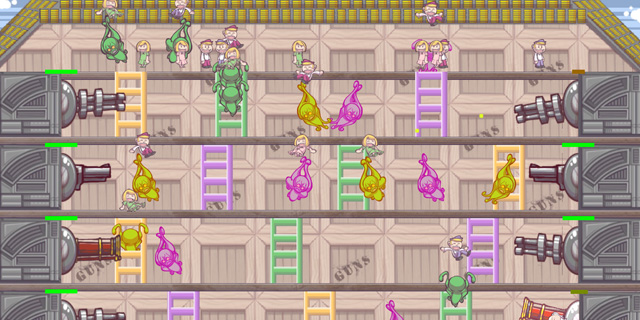
Writer Mike Walbridge’s goal: play every Molyjam game and tell you about them. Want to know more? Click here.
286: When Doves Cry: “You are a Pigeon who must go around the city trying to persuade business men not to jump off buildings by retrieving items from their home.”
This game truly does let you fly around the city, retrieving items to give to suicidal men on top of buildings and bridges, all during a serious, piano-plink-filled soundtrack. It’s particularly touching, as the items vary and each man says something different upon meeting you (and again when you give him his personal item to change his mind). Items include a watch, a wedding ring, a bible, a knife, a novel, and a letter. Each has a story to it.
This seems like it could easily be adapted to being a serious game about suicide prevention or at least a dramatic element of an RPG or Alan Wake-type of game where your decisions influence what a person will do with his life. It is more narrative than game, but that doesn’t mean that this mechanic can’t work or can’t be powerful or effective. It’s surprising that a tiny game like this is able to be literally be so weighty as to be about life and death.

279: Orphanage Arsenal: “You live in a little house made of guns. You need many guns to fight invaders but you also need to keep a roof on top of your many children.”
Wow, Lock’s Quest tower-repairing in 2D platform fashion! You have turrets that you turn on to shoot at enemies, but they wear themselves out of condition and ammo and you must fix them manually to get them back to working order.
This is an idea that I can’t remember ever having seen in this exact format, but this framework is a great beginning to a great downloadable/indie/phone game. Incredible that 48 hours can convince someone of this.

275: A Civilized World: “Perhaps someone could make the game that never was? A game that lasts one second?”
This is actually hilarious. There are 6 different people and 11 different professions and two different living conditions that you can choose, and no matter what combination you choose, there is only one result, and that is that the game ends in one second when you are obliterated by a nuclear bomb. You get a score of 0, and are baldly promised, you can do something with that one futile second.
This easily draws comparison with 20th-century absurdist pieces like Dr. Strangelove or Cat’s Cradle, a movie and book that subtly shouts at us how stupid, bizarre, unfair, and thoughtless the world can be now that it has nukes.
The world doesn’t worry as much about nukes anymore, but it’s nice to see a game make a statement like that. The futility technique has been employed as narrative technique in Call of Duty 4: Modern Warfare and its sequels, but this game, which has a very different style, shows us that there are other ways this can be presented. Bravo.
For more Molyjam games, check out Mike’s blog and the Molydeux Reveux archive.



















